

Safety Tips For Online Banking The Link Between Money & Mental Health WINTER 2023 PAGE 8 PAGE 16
People’s Community Action Corporation (PCAC) has created a Food Drive-Thru on Fridays. The program operates as a touchless option, where staff and volunteers load groceries into vehicles and allow community members to receive resources in the comfort of their own car. This program was born during the pandemic when individuals were short on jobs and finances. PCAC wanted a program that would bridge the gap and help families in need, by creating access for people to receive groceries and feed their families. By creating access for families to receive groceries and feed their homes, PCAC has serviced over 5,721 households and continues to grow.
When asked, “Why host a Food Drive-Thru?” Mark Sanford, Executive Director of PCAC, stated that it was the fastest and safest way to get the food out to the people. He further stated that this allowed easy access to healthy, local, and fresh food. With many families wondering where their next meal is coming from, PCAC cares deeply about the community and is here to help.
Food Drive-Thru

Hours: Friday from 10am-12pm. (Some Fridays are restricted due to Holiday hours or operation and inclement weather.)
Location: 5701 Delmar Blvd. Parking Lot
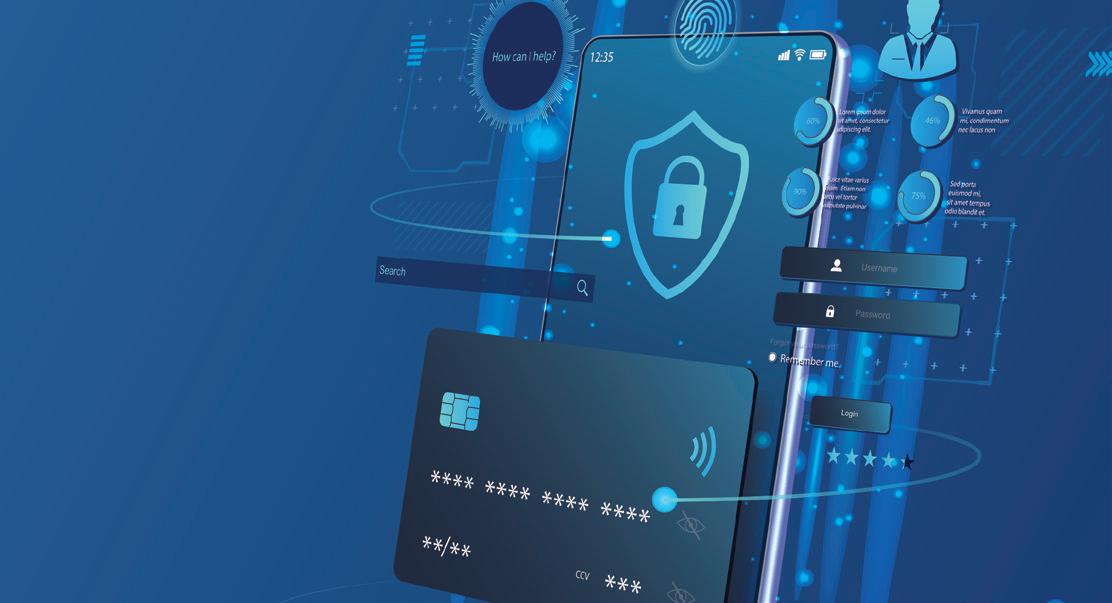
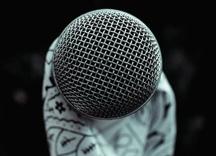
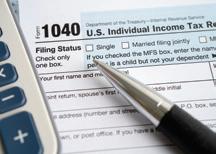
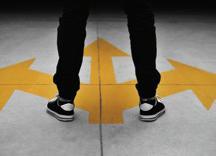
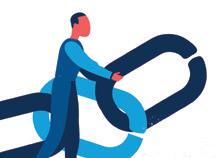
TABLE OF CONTENTS This program and magazine production were funded 50% $15,000 by non government sources and 50% $15,000 by federal funds. The federal funds are from the U.S. Department of Health and Human Services (HHS) provided by the Missouri Department of Social Services. People’s Community Action Corporation 4236 Lindell Blvd Suite 300 , St. Louis MO 63108 • 314-862-6270 8 Safety Tips For Online Banking Shayla McClendon 4 Credit – What Does It Mean to You? On The Money Team 11 5 Rappers That Have a College Degree Cindi Frazier 15 Pink Tax vs. Tampon Tax Cindi Frazier 5 Finance 101 On The Money Team 12 Choosing a Career Shayla McClendon 16 The Link Between Money and Mental Health Enkosi Key 6 The Benefits of a College Degree Darnell Wright 14 A Look Back in History Dajon O’Kelley 18 Drug Abuse Darnell Wright 3 STL ON THE MONEY
CREDIT
Understand How to Control Your Spending and Paying Down Your Credit Cards
What Does It Mean to You?
Multiple cards mean numerous chances to build debt. It’s also easier—and in the long run less expensive—to make larger payments on one card than to make minimum payments on many, one major card would be the goal. Don’t cancel the cards, just pay them off and stop using them. Better yet, destroy them. Keeping the accounts open actually works in your favor when it comes to your credit score because it gives you a higher available credit ratio. Be sure to check all your account statements regularly to ensure you’re not victimized by identity theft or hit with non-activity or other fees.
Use a Debit or Pre-paid Card
Decide How to Use and Develop Credit
You need to be clear how you want to use your credit: convenience, emergencies, big purchases you can afford to pay over time. This will allow you to control the level of debt you build up.
FICO Score
Stop Using Store Credit Cards
They typically charge the highest interest rates (up to 22 percent or more). Also decline discount offers that require signing up for a store’s card. If you need to use credit, charge it to the one card you are using for all your purchases.
Questions To Think About
Why does my credit score matter?
What will it take to obtain credit?
What is the importance of having a higher credit score vs a lower credit score?
If you must use plastic, or don’t like carrying cash, use a debit card that withdraws money from your checking account, or a pre-paid card with a fixed limit. You will get the convenience of a credit card without going into debt. Focus on learning to control your spending and paying down credit cards.
A three-digit number based on the information in your credit reports. It helps lenders determine how likely you are to repay a loan. The higher your score the easier and more secure to obtain low interest loans many times with no money down, the lower the score the higher interest rate with the probability of being declined for credit seeking purchases and may need a down payment or even a cosigner.
Exceptional: 800 and Higher
Very Good: 740 to 799
Good: 670 to 739
Fair: 580 to 669
Poor: 579 and Lower
On The Money Team 4 WINTER 2023
FINANCE

Financial education should begin at an early age in school because habits acquired in childhood are continued into adulthood. One of the most significant factors for the success over time is a wise use of money.
Students improve their financial awareness through public education and obtain life skills set by their upbringing. At first, the finance conversation focused on adults, but recently, these conservations were extended to include young people. Here are considerations when teaching youth skills to manage financial resources effectively.
When kids want to buy something, even if families can afford it financially, we must teach kids to appreciate a purchase. If adults give in to them every time they ask for something; they will not achieve financial responsibility and

appreciate what they are getting. The ability to delay gratification can also predict how successful one will be as a grown-up. Kids can learn that if they really want something, they should wait and save to buy it.
Also ask questions such as: Does the child really need this? Does price pay off? What will they do with it? What would they have to give up in return? The intention is to make the child make an informed economic decision before making the purchase. The sooner parents start taking advantage of everyday teachable money moments (for example, give a sixyear-old $2 and let them choose which fruit to buy), the better off the younger generation will be. Parents are the number one influence on children’s financial behaviors, so it’s up the adults to raise a generation of mindful consumers, investors, savers, and givers.
Families can discuss how much they can contribute to a child’s college education each year. By tackling the subject early and being honest about what your family can afford will help kids be realistic about where they may apply.

 On The Money Team
On The Money Team
5 STL ON THE MONEY
Should You or… …Shouldn’t You? 6 WINTER 2023
The Benefits of a College Degree
Earning a college degree is such an important step in life that has become a central part of the “American Dream.” Go to college, get a job, buy a house, and raise a family. It may not always be that simple, but it all starts with an education.
Earning a college degree is about opening opportunities in life. It prepares you, both intellectually and socially, for a career and adult life.
The opportunity to earn more money is a driving force behind going to college. A post-secondary degree, whether it is a bachelors, masters, or PhD, is the most common route to careers that demand additional skills and offer higher pay. Most jobs that require a college degree tend to provide benefits like health care, retirement, and travel. These types of benefits are rarely offered for high-school-level jobs.
Earning a college degree is the most common pathway to a better career. When pursuing higher education, not everyone will know what they want to do when they grow up. However, most people want to have a job that pays well and feels secure and satisfying. That combination of benefits are reasons why so many people make the investment of time and money to go to college.
Attending college is a major commitment but is also a down payment on success. Earning a college degree will help guide people towards their goals and future careers. It requires a lot of challenging work, but that prepares you for a rewarding career and fruitful life.
Having a professional network can help people learn about upcoming jobs before others do. By creating a professional network, there can be opportunities to finding a job or getting a promotion. Those networks start forming in college.
Colleges are filled with volunteer organizations and professional societies where you can meet others in your field. Through these contacts, you may learn about opportunities, like internships, while you are still in school. These real-world experiences will help build your resume.
People underestimate the value of personal growth that they will experience as they are working towards their degree. A college education requires students to overcome all types of adversity and prepares them not only for the workplace but for dealing with many life’s challenges.
Whichever educational path students choose to pursue, one thing is clear, they must be better prepared to face an increasingly competitive job market and turn their college education into a winning proposition.
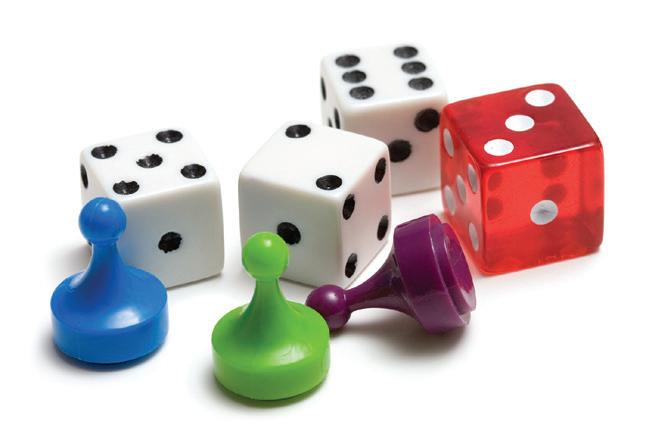 Darnell Wright
Darnell Wright
7 STL ON THE MONEY
Safety Tips Online FOR
Attacks on your bank account are unexpected and can leave you wondering “How could this have happened?”
You are sure that you have taken the proper precautions to keep your account safe, but in reality there are multiple ways hackers can access your account that you would not expect.
Unfortunately bank fraud is a common problem of everyday life that affects many people, The Federal Trade Commission states that there were more than 33,000 bank fraud reports in 2021. Although this is our reality, there are ways to fight off devious hackers.
Create a Strong Password
Almost everyone knows to create a strong password to stay safe, but is your password as secure as you think it is? Creating a long password does not make your account secure if the patterns, words, numbers, and symbols are simple to guess. By not putting enough effort into making your password difficult to figure out, you will become an easy target. Here are a few examples of good passwords and bad passwords according to security.harvard.edu.
Good Passwords
A good password should meet the following requirements.
• An uppercase letter
• An lowercase letter
• A number (0-9) or symbol (!, @, #, $, %)
• Ten or more letters
A way to start a good password is by using a word you will surely remember, then add pieces of the requirements listed.
• subtract turns into sUBT4#ract
Bad Passwords
A bad password would be using four digit years, the password “password”, sports references, names, personal information, and patterns like “12345…”,”asdf”,”abc123”.

• Years & Dates – Do not use years or dates that signify anniversaries, famous events, and birthdays.
•
“Password” – Everyone has thought of making their password “password” at least one time. You may think this is clever and original, but it is the quickest way to get your account hacked. Variations of “password” include “pass” and “p@$$word”.
• Sports References – Do not use references to sports such as “football”, “hockeylover”, “#1baseballfan”, sports teams, and the players.
• Personal Information – Never use personal information as a password, you would be putting more than just your bank account at risk. This includes your name, phone number, email address, social security number, and address.
8 FALL 2022
Banking
• Keyboard Patterns or Sequences –Patterns like “abc123”, “123456”,”asdf”, and “qwerty” are too simple and easy to guess. Like previously stated, this is not a clever or original, and you will be at risk.
If you cannot think of a complex password, a safe and helpful tool would be to allow your computer or handheld device to generate a hard to guess password for you. Your device will create a complex password, save it in a password manager, and when you need the password it will give you the option to autofill the information. Another helpful addition, if available, would be to set up a twostep verification process. Before you are logged in, a verification should be sent to another device
to unlock your account or you may be given the option to use a fingerprint. Once you are finished using your account, go through the process of logging out of your account never swipe it away or shut it down.
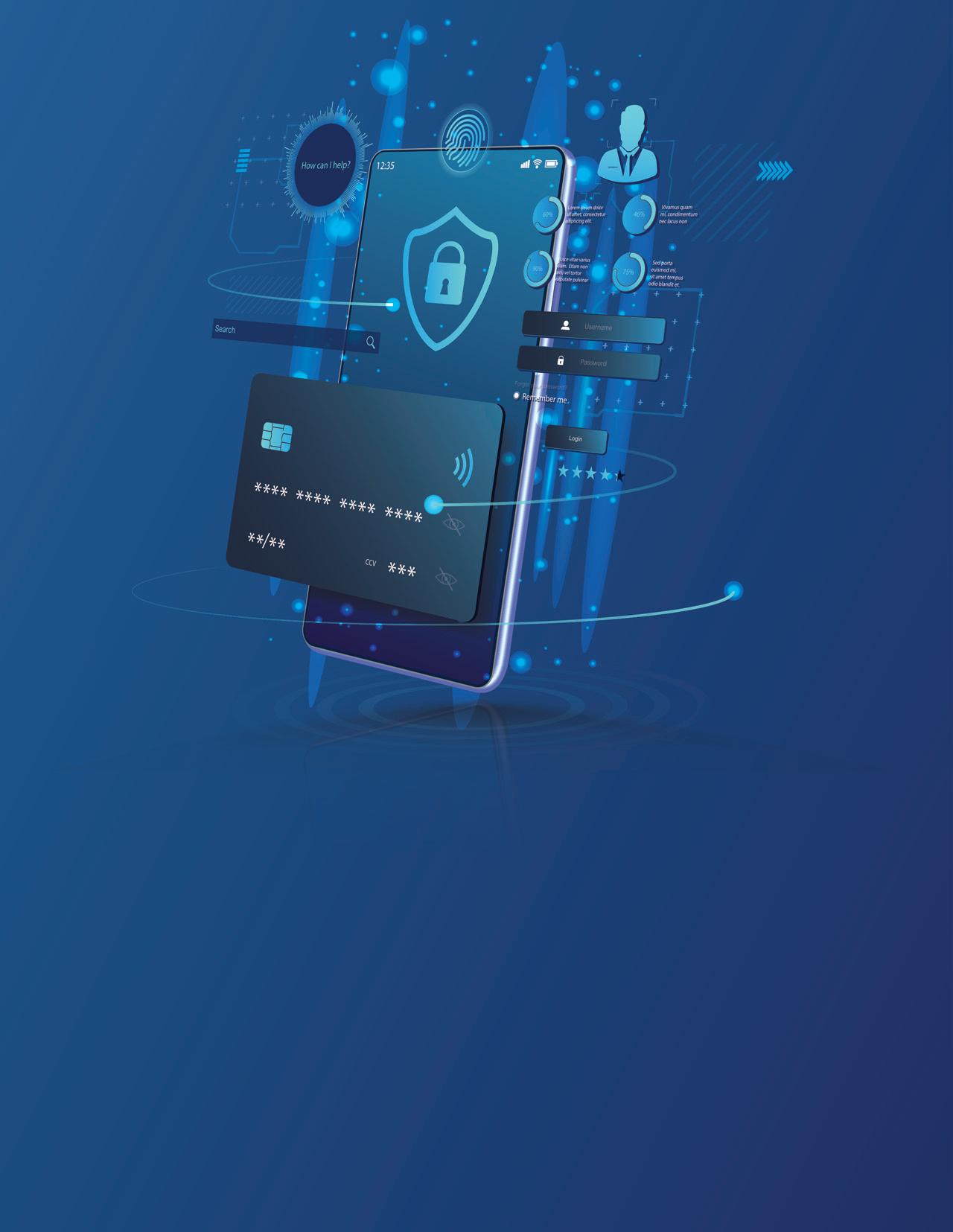
Avoid Using Public Wi-Fi
Public Wi-Fi is not 100% secure, hackers can create fake or “spoofed” Wi-Fi services and hope that you click on the recommended network, the fake network usually looks the same or slightly different from the original. By clicking on the network, the hacker now has full access of the online sites and apps that you use and can cop your log in information. They may also access this information by sending internet links via text from an
CONTINUED 9 STL ON THE MONEY
Safety Tips for Online Banking
unknown number and you click it or you may log into a fake identical website created by a hacker. To avoid this, ignore strange messages or links from unknown numbers. When going online to log into your account, make sure that the top of your search bar has a padlock and not a warning symbol with text that says “Not secure!” You are susceptible to being hacked at places that provide free Wi-Fi at coffee shops, fast food restaurants, retailers, hotels, airplanes, and work. Make sure you conduct your financial business before you leave home and hold off until you make it back.
Do Not Provide Your Banking or Personal Information via Email

Your financial institution would never ask for your social security number, credit card, and bank information through an email. Lakelandbank.com states that it is not normal for banks to send emails or text messages that asks you for your account information. They will only ask you for this information to verify your identity when you call them directly.
Do Not Access Your Bank Account from a Shared Device
Avoid accessing your bank account from a computer or device that is not yours or that is shared. This would include public computers or devices in libraries, schools, hotels, and friends or families devices. It is possible that your information will become available to hackers on these public devices or if your friends and families enter an area where hackers are active.
Do Not Use ATMs In Bad Locations
ATMs are susceptible to being modified with card skimmers, scammers use these devices to steal your card information and make a copy of it once you swipe your card. This happens at locations where an ATM stands alone, there are gas stations, and restaurants that take
your card to pay for the bill. 121 Financial Credit Union states that there are two types of skimming devices, the original skimmers that look exactly like the machines actual card reader that are placed on top of the safe and original reader and the shimming device in which the hardware device goes inside the card slot instead of being fit on top. There may also be a tiny well placed camera to record your information being typed in combination with an original skimmer. The following will help you protect yourself and red flags to look out for.
Red Flags
• Card reader is loose or is difficult to slide in your card.
• The security seal is broken, damaged, or missing.
• The keypad on the ATM is wiggly or loose.
• You can see a camera in an odd place and suspect that it may not be a security camera. If this is so, please do not use the machine and alert a staff member!
How to Protect Yourself
• Use ATMs in well-lit and in busy areas or ATMs that are physically closer to the building.
• Pay for gas inside and avoid using your debit card if possible. Pay with a credit card, cash, or your mobile wallet.
• If you use a specific ATM regularly, look around to see if anything seems off before you use the machine. Does the reader look different than before or than from other ATM readers in the area?
• Use a credit card with a chip, this makes your card harder to skim.
• Set up fraud alerts on your cards and identity monitoring.
• If you believe that your card has been skimmed immediately call your local police for further investigation!
Shayla McClendon
CONTINUED 10 WINTER 2023
5 Rappers That Have a College Degree
You often hear about artists who dropped out of school or simply just do not enroll in order to live out their dreams of becoming a superstar. In most cases, you see those artists express a great deal of regret about that decision. Although there is a long list of artists, specifically rappers that do not go to college, here is a short list that highlights a few that did get a degree.
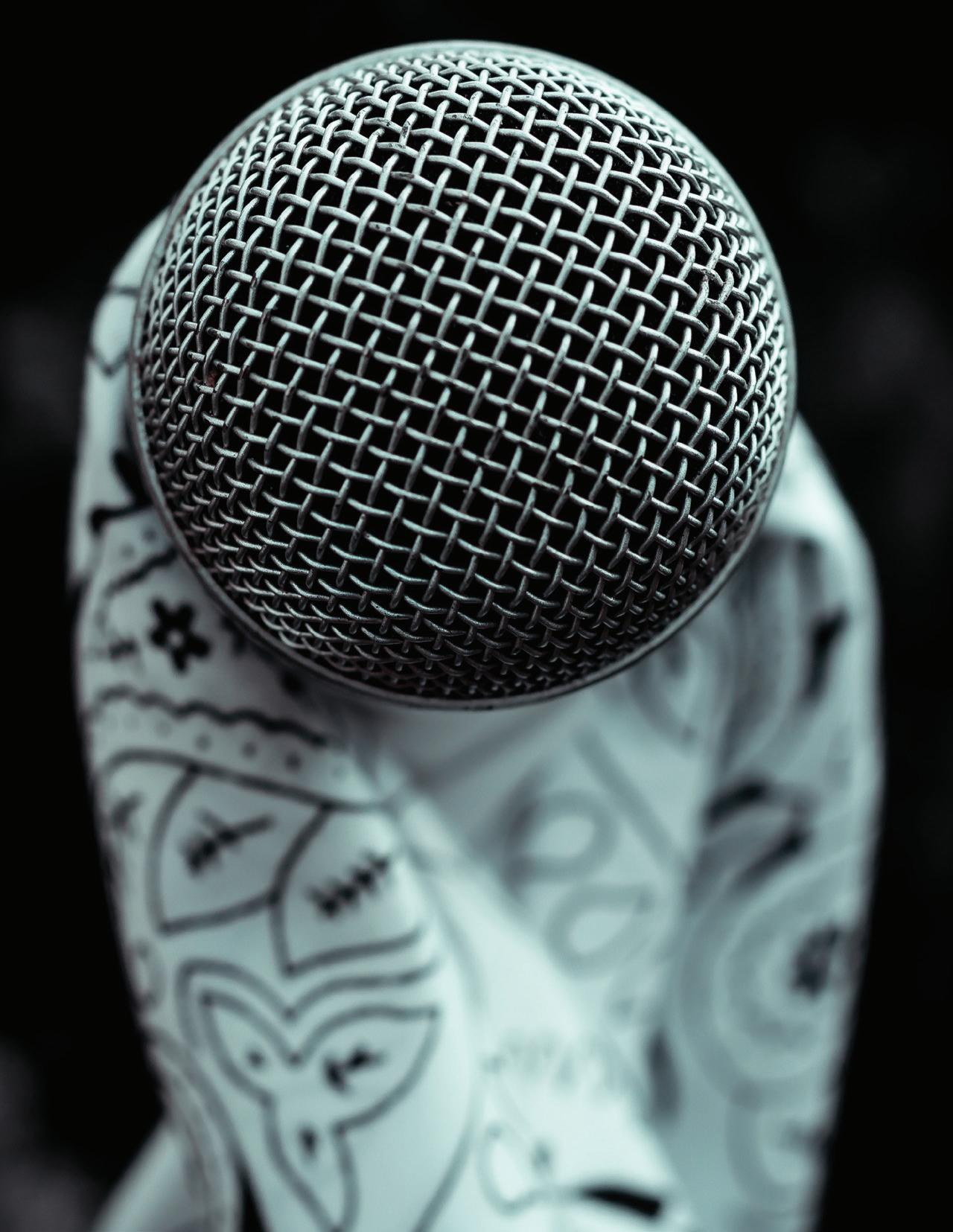
J Cole
Best known for his conscious rap lyrics and producing style, rapper J Cole attended St. John’s University and graduated with the highest honors in communications and business.
Saweetie
Megan Thee Stallion
The world’s favorite ‘hot girl’ attended Prairie View A&M University but dropped out once her career started to take off. She eventually returned to school completing her degree in Health Administration at Texas Southern.
Childish Gambino
Well known for her fun party girl lyrics and sampling of classic hip hop songs, rapper Saweetie attended San Diego State University. She eventually transferred to the University of Southern California where she earned a Bachelor of Arts in communications.
Best known for his hip hop, funk, and R&B fused music style, as well as his hit show ‘Atlanta’, actor and music artist, Childish Gambino attended Tisch School for the Arts where he earned a degree in dramatic writing.
2 Chainz
Best known for his fun and trap style of music, rapper 2 Chainz attended Alabama State University. He eventually ended up having to transfer to Virginia State University where he received his degree in Psychology.
Although not going to college is sometimes looked down upon, there are a bunch of extremely successful people who do not have a college education. On the flip side, college could better your chances at being more successful. These are considerations to keep in mind when figuring out what to do after high school.
Cindi Frazier
11 STL ON THE MONEY
It is a difficult task to get paid for what you enjoy. To figure out what career you wish to pursue you must analyze your skills, values, work ethic, the lifestyle you want to live, and what you enjoy.
Choosing a Career ANALYZE

When preparing for a career search, you must understand your skills and values. This determines your compatibility with your desired job and how well you would work in the environment. For example, if you are the type of person to take your time while working you probably would not work well in a fast-paced environment. The value portion of your analysis determines what your values are and how your job meets them. If you value keeping the earth clean and your job is a nonprofit that reuses single use items that would have been thrown in the garbage, that job may be for you. Questions to ask yourself:
Skills
• How often do you like to work?
• What are your strengths and weaknesses?
• What soft skills do you already have?
• Can you handle challenging projects or situations?
Values
• What is important to you?
• What motivates you?
• Is there a positive change you want to be a part of?
• What are your priorities?
SKILLS
Everyone has something that they are slightly good at or that they can improve on. These could be hard skills ranging from computer technology: social media, Microsoft office, foreign languages, copywriting, etc.
1 2 12 FALL 2022
LIFESTYLE
How expensive is the lifestyle you are trying to achieve and how much would it cost to live that lifestyle every month? Most jobs will not pay you enough each month to live a high-end life, you would have to climb the ladder at your job to increase your pay rate, but that could also take a long time.
WHAT DO YOU ENJOY
Think of what you enjoy or like to do and think of how you could make a living pursuing those interests.
WORK ETHIC
How often would you like to work and how long does it take you to complete a task?

To discover careers similar to what you enjoy doing, try to look in the U.S Bureau of Labor Statistics (BLS) and Occupational Outlook Handbook. This government website has a vast list of careers in different categories such as architecture & engineering, arts & design, building & ground cleaning. BLS also gives a brief job summary and what the job is like, the level of education needed for the job, the median-pay according to 2021 & wages by state and area, and the job outlook (how fast the occupation is growing). If you do a deeper dive into the website there is more information and resources it can provide you with. If you need more help to determine your career choice, here are three resources: onetonline.org, yourcareer.gov.au/ your-future-career, and mynextmove.org.
Shayla McClendon
4 5 3 13 STL ON THE MONEY
A Look Back in History
When people think of inventors, many greats come to mind like Thomas Edison, Alexander Graham Bell and Henry Ford. From my perspective and many of my classmates, it is rare that Black inventors get the shine and credit that is due. Sure, we have George Washington Carver but there are plenty of other inventors that need more recognition for their early contributions in science, technology, engineering and mathematics (STEM).
Garrett Morgan
Garrett Morgan was a businessperson, community leader and most importantly an inventor. He most famously created the smoke hood (the predecessor to the gas mask) and the three-position traffic light. Morgan invented a safety hood smoke protection device after seeing firefighters struggle with the smoke they encountered while on duty. The mask worked by using different tubes to collect clean air from the ground. Now onto the traffic light, there were multiple versions of the traffic light before Garrett decided to make his own. Many years ago, pedestrians, bicycles, animal-drawn wagons, and automobiles all had to share the road at the same time. With Morgan witnessing multiple accidents in 1920, he filled out a patent for a traffic light that had a third “warning” position. He was simply ahead of his time. He helped influence the modern day, but he is not the only person who did so.
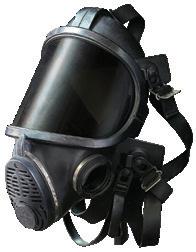
Garrett Morgan’s inventions led the way to modern stoplights and firefighter’s masks.
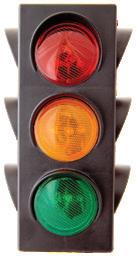
Marie Van Brittan Brown
Marie Van Brittan Brown was a nurse and brilliant inventor. In 1966, she and her husband, Albert Brown, invented a video home security system. The patent was granted by the government on December 2, 1969, and four days later, the New York Times ran an article about her invention. It single-handedly influenced the home security system we still use today. Crime in Brown’s neighborhood ran high and often the police responded too slowly for emergency calls. Instead of letting vandals get away with crime, Brown and her husband decided to create the video home security system. With that simple idea alone, she stopped millions of crimes since that day and saved countless lives, according to the Home Security Alarm Magazine. Brown passed away at the age of 76 in 1999, but her legacy continues. Brown’s contribution to home security led her invention to be cited in 32 subsequent patent applications according to info-lemelson@mit.edu.
Today’s home security systems have their roots in Marie Van Brittan Brown’s original system.

The list of African American inventors documents the many contributions in STEM. Ranging from practical everyday devices to applications and impactful discoveries, this has allowed our country to thrive. I encourage everyone to get involved in STEM at your school or talk to your counselor about STEM related opportunities. Try doing your own research because you might learn something new and intriguing the exact way I most certainly did.
 Dajon O’Kelley
Dajon O’Kelley
14 WINTER 2023
Pink Tax Tampon Tax vs.

Women have it hard. From the #MeToo Movement, sex trafficking, and now Roe vs. Wade being overturned, it seems like the war on women and their bodies just keeps getting worse. The war on women’s finances is starting to become an even bigger issue. Women are facing a pink tax and tampon tax that will cut into their finances.
If you’ve never heard of these terms before or do not know the difference between the two, lets break it down. Pink tax is not an actual tax, instead it is a price difference with women’s products. Pink tax also applies to female children’s clothing and toys. The name pink tax stems from the color most manufacturers use for products targeted towards women and girls.
Tampon tax is an actual sales tax that women pay when purchasing feminine hygiene products such as tampons, razors, feminine wash or feminine wipes. Due to some states not considering these products as necessities, they are taxed differently than other products. This is a huge financial barrier for women. According to forbes.com, states profit an estimated $120 million off women based on these taxes and price increases. This is one example of financial discrimination towards women.
Financial discrimination is discrimination based on economic factors such as job availability and wages. These financial strains make it harder
for minority women to afford these essential products, since they often earn less than their White counterparts. Although this is an issue for all women.
This is not just a gender issue but a serious financial issue. Women should not have to pay extra for basic feminine necessities, especially women who are already financially impaired. Countries such as Canada and Australia have already abolished or reduced sales taxes on these products.
A few states in the U.S have already made progress or are currently trying to make changes. Even some major universities are addressing the issue. Menstrual products are now available at no charge in restrooms in some 30 buildings on Washington University in St. Louis’ Danforth Campus. And soon, such products will be available on the Medical Campus. The free products are meant for emergency and occasional use.
The programs will help meet a basic health need, said Kawanna Leggett, associate vice chancellor for student affairs and co-chair of a committee that studied how and where free menstrual products should be provided. It’s time to stop punishing women for being women.
Cindi Frazier
15 STL ON THE MONEY
Mental Health Money The Link Between


MENTAL HEALTH AWARENESS
16 WINTER 2023
Mental health and money problems are often intricately linked. One problem can feed off the other, creating a vicious cycle of growing financial problems and worsening mental health that is hard to escape. More than 1.5 million people are experiencing both problem debt and mental health problems. moneyandmentalhealth.org

People With Mental Health Problems Are More Likely to Be in Problem Debt
• Almost one in five (18%) people with mental health problems are in problem debt. People experiencing mental health problems are three and a half times more likely to be in problem debt than people without mental health problems (5%).
• 72% of respondents to Money and Mental Health’s survey said that their mental health problems had made their financial situation worse.
How Does Being in Financial Difficulty Affect Your Mental Health?
• Financial difficulties are a common cause of stress, and stigma around debt can mean that people struggle to ask for help and can become isolated. The impact on people’s mental health can be particularly severe if they resort to cutting back on essentials, such as heating and eating, or if creditors are aggressive or insensitive when collecting debts.

• Financial difficulty drastically reduces recovery rates for common mental health conditions. People with depression and problem debt are 4.2 times more likely to still have depression 18 months later, compared to people without financial difficulty.
• People in problem debt are three times as likely to have thought about suicide in the past year. Suicide is a complex phenomenon and there are usually a range of social factors, life events and other circumstances that drive someone to think about it. However, there is a strong link between problem debt and suicide. enrich.org
CONTINUED 17 STL ON THE MONEY
The Link Between Money and Mental Health CONTINUED
How Does Having a Mental Health Problem Affect Your Finances?

People experiencing mental health problems are less likely to be in paid employment, and more likely to be in low-paid employment. Only 43% of people with mental health problems are in employment, compared to 74% of the general population and 65% of people with other health conditions. People with mental health problems are also overrepresented in high-turnover, low-pay, part-time or temporary work.
Some people experiencing mental health problems will be reliant on benefits when they are unable to work. A third of Housing Benefit claimants (35%) — and nearly half (47%) of adults aged 16-64 in receipt of some kind of out of work benefit — have a common mental disorder, such as depression or generalized anxiety disorder. This rises to two thirds (66%) of people claiming Employment and Support Allowance (ESA), a benefit aimed at those unable to work due to poor health or disability. How does having a mental health problem affect your finances?
Mental health problems can shape how our minds work and how we behave, as well as our emotions. Common symptoms of mental health problems, such as increased impulsivity and memory problems can make it harder to keep on top of monetary management or to get a good deal in complex markets, increasing the likelihood of financial difficulty.
Many people with mental health problems report that their spending patterns and
ability to make financial decisions changes significantly during periods of poor mental health. A Money and Mental Health survey of nearly 5,500 people with mental health problems found that, while unwell:
• 93% spent more than usual
• 92% found it harder to make financial decisions
• 74% put off paying bills
• 71% avoided dealing with creditors
• 56% took out a loan that they would not otherwise have taken out
According to United States of Stress Survey, mental health problems can also make it harder to engage with essential services, such as banks and energy companies. People can struggle to understand bills and remember account details, which can lead to financial difficulties and distress. Four in ten (37%) people who have experienced mental health problems exhibit significant levels of anxiety when dealing with essential services, including symptoms such as a racing heart or trouble breathing.
Vaile Wright, senior director of health care innovation at the American Psychological Association states Many people will not disclose mental health problems to essential services providers, often due to stigma. And a third (36%) of people experiencing a common mental disorder like depression or anxiety have never received a diagnosis, and might not even know what they are experiencing is a clinical mental health problem.
MENTAL HEALTH AWARENESS
Key
Enkosi
18 WINTER 2023
Drug Abuse
What is Drug Abuse? The excessive, maladaptive, or addictive use of drugs for nonmedical purposes despite social, psychological, and physical problems that may arise from such use. Abused substances include such agents as anabolic steroids, which are used by some athletes to accelerate muscular development and increase strength and which can cause heart disease, liver damage, and other physical problems. (National Institute on Drug Abuse)
It is easy to recognize the obvious risks of drugs (Meth, Cocaine, Crack, Lean, Opioid addiction), alcohol and nicotine use. People who abuse drugs may appear incoherent, glassy eyed, or sudden change in mood or behavior that can result in negative consequences like car accidents, personal injuries and in some cases may even lead to addiction. But less obvious is the impact substance use has on the developing brain.
In the same way we come to recognize the negative consequences that a pregnant woman’s drinking or smoking can have on
developing fetus, we now know there are distinct risks to brain development with teen substance use. Vaping, drinking or using substances can damage the brain’s wiring, increasing the likelihood of learning difficulties and physical and mental health problems during the teen’s years and well into adulthood. Just as a house is still functional with a cracked foundation and faulty wiring, so is the human brain, but neither is optimal. Many types of challenging behaviors are normal during the teen’s years, but experimenting with substances is not one of them. We also need to rethink our perception of norms. It is not true that “everyone vapes” or “everyone drinks”. A variety of common teen experiences can become an excuse or reason for substance use.
Understanding why some teens drink or use substances can be a valuable step toward keeping them healthy and safe. Some teens use drugs and alcohol to overcome insecurities, let their guard down and feel confident in social settings. If you or anyone you know is battling Drug Abuse call 1-800-950-6264.


19 STL ON THE MONEY
Darnell Wright



If you’re on social media using Facebook, Instagram or LinkedIn, we encourage you to stay connected with People’s Family of Corporations. Here are our social media tags and URLs. Connect with us now using your personal mobile device. Connect With Us On Facebook @peoplesfamilyofcorp @bjkpeopleshealthcenters @almhopewellcenter @peoplescommunityactioncorp LinkedIn www.Linkedin.com/company/peoples-health-centers-inc www.Linkedin.com/company/people-s-community-action-corporation/ www.LinkedIn.com/company/peoples-family-of-corporations/ www.LinkedIn.com/company/amanda-luckett-murphy-hopewell-center/ Instagram @peoplesfamilyofcorporations @bjkpeopleshealthcenters @almhopewellcenter @peoplescommunityactioncorp SOCIAL MEDIA Your Opinion Matters Take a Survey and Tell Us What You Think












 On The Money Team
On The Money Team
 Darnell Wright
Darnell Wright









 Dajon O’Kelley
Dajon O’Kelley









